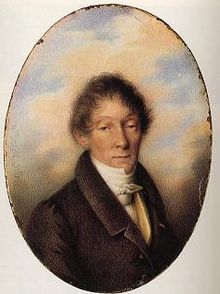- Andrey Razumovsky
-
Count (later Prince) Andrey Kirillovich Razumovsky (Russian: Андрей Кириллович Разумовский, Rasumovsky; Ukrainian: Андрі́й Кири́лович Розумо́вський, Andriy Kyrylovych Rozumovskyi; 2 November 1752 – 23 September 1836) was a Russian diplomat who spent many years of his life in Vienna.[1]
Contents
Life
Razumovsky was the son of Cyril Razumovsky, the last hetman of Ukraine, and nephew of Aleksey Grigorievich Razumovsky, called the Night Emperor. The elder Rasumovsky's late Baroque palace on the Nevsky Prospekt is a minor landmark in Saint Petersburg. In 1792 Andres Kyrillovitch was appointed the Tsar's diplomatic representative to the Habsburg court in Vienna, one of the crucial diplomatic posts during the Napoleonic era. He was a chief negotiator during the Congress of Vienna that resettled Europe in 1814, and asserted Russian rights in Poland.
In 1808 he established a house string quartet consisting of Ignaz Schuppanzigh, Weiss, Kraft and Sina. Razumovsky was known as a competent torban (Ukrainian theorbo) player. Of four torbans known to have been in his possession one is preserved in the Kunsthistorisches Museum in Vienna.
His commissioning three string quartets from Beethoven in 1806 was the act that has made his name familiar. He asked Beethoven to include a "Russian" theme in each quartet: Beethoven included Ukrainian themes in the first two. Razumovsky was the brother-in-law of another of Beethoven's patrons, Prince Joseph Lobkowitz.
The Palais Rasumofsky

The Palais Rasumofsky in Vienna
(contemporary etching by Eduard Gurk)He built a magnificent Neoclassic embassy worthy of the representative of Alexander I, at his own expense and to the designs of Louis Montoyer, in Landstraße, quite close to the city, and filled it with antiquities and modern works of art . On New Year's Eve 1814, he held a glittering ball with the Tsar Alexander I as guest of honor. Probably the only person in Vienna who was invited but did not go, was Beethoven. To accommodate the guests, Razumovsky erected a temporary ballroom extension, heated by a flue from the palace. After all the guests had gone, the flue caught fire, setting the ballroom ablaze and burning out roomfuls of art in the palace. Rasumovsky, though he was raised to Prince the following year, was never the same. He lived in seclusion in Vienna until his death in 1836.
See also
- String Quartets Nos. 7 - 9, Opus 59 - Rasumovsky (Beethoven)
- Razumovsky, about his family
- Galitzine, about another Russian prince and patron of Beethoven
Notes and references
- ^ His name is transliterated differently in different English sources they include Razumovsky, Razumovsky, Rasoumoffsky, and Rasoumoffsky the last of which is used by the British Government for its official translation from the French of the Paris peace treaty of 1815 and the Final Act of the Congress of Vienna
External links
- Mad About Beethoven website: Razumovsky and the tragic fire.
- Zerkalo Nedeli (Mirror Weekly) № 38, 1996 (in Russian)
- Portrait of Andrey Kyrillovich Razumovsky, aged 24, in the National Gallery of Victoria (Melbourne, Australia)
The evolution of the three Partitions of Poland during the end of the 18th century, leading to some 125 years of polish political eclipse of the formerly secular powerful Lithuanian-Polish Kingdom till 1918 can be seen in the well informed page:
Categories:- 1752 births
- 1836 deaths
- Ambassadors of Russia to Austria
- American classical musicians
- Russian nobility
- Imperial Russian politicians
- Torbanists
Wikimedia Foundation. 2010.

